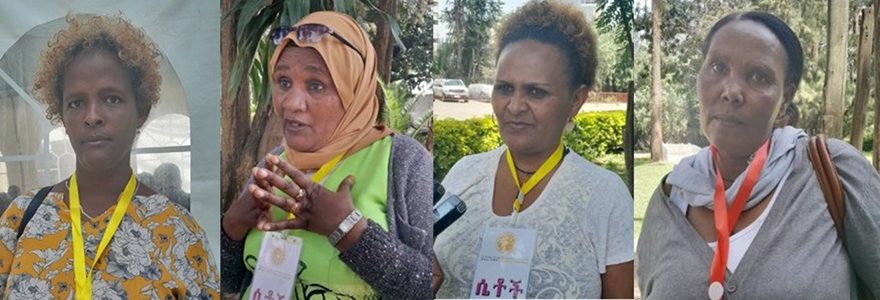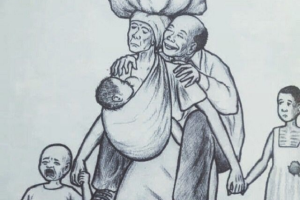
Women constitute around 52 percent of the population of the Horn of Africa which justifies their meaningful inclusion in all peace processes. Although there is evidence that they are involved and have achieved tangible results in peace work, they remain a distinct minority in formal peace processes, according to a document published on inclusion of women in peace building processes (negotiation and mediation): Women’s peace and security agenda by American Friends Service Committee.
It also stated a study conducted by the Council of Foreign Relations (2019), which analyzed forty-two (42) peace processes and agreements across the globe between 1992-2019 that revealed women only accounted for a mere average of 9.5 percent of peace mediators involved in these processes.
Similarly, research published by Center for Humanitarian Dialogue (HD), beyond the numbers: women›s participation in the Kenya National Dialogue and Reconciliation indicated that broader inclusivity in formal peace processes of civil society as well as of women, increases the credibility of the process and contributes to the sustainability of the agreements reached.
“Peace processes characterized by heavy involvement of women have been found to be more legitimate and sustainable compared to those with little or no women’s involvement. Civil society members, and indeed women, in peace processes serve as important counterweights to what are, often, political or military interests,” it stated.
Despite this growing consensus on the importance of women’s participation, many challenges still remain. These vary from the cultural acceptability of having women participate; the focus on the participation of formal fighters and political decision-makers; to the perceived lack of capacity of women who could be effective representatives within a formal process. Interestingly, in the Kenya case, these traditional challenges were considerably less than in other cases studied, it said.
However, the culture of excluding women is compounded by their treatment as victims of conflicts rather than agents of change which in return diminish their agency.
“While a great number of studies have documented the value of involving women in peace processes, greater attention needs to be paid to the many different ways that women participate – via civil society inclusion, as well as political representatives, within the negotiation teams; as members of the mediation teams; and (though rarely) as mediators,” the document emphasized.
During the agenda gathering consultation phase that the Ethiopian National Dialogue Commission held recently, women representatives that were taking part expressed their optimistic view that the National Dialogue could bring for fellow sisters who are the primary victims of unrest.
Representing women at the consultation, Meseret Kibiret, told the Ethiopian Press Agency (EPA) that the dialogue is the best solution to resolve differences. Thus, the National Dialogue would play a significant role in addressing the longstanding differences that have been passed from generation to generation.
“Not only is it vital for resolving challenges but the National Dialogue would play a major role in bringing lasting peace to Ethiopia which could help the nation to focus on its development journey.”
Ajaiba Mohammed, another women representative at the consultation indicated that the National Dialogue would create a better Ethiopia for citizens from all walks of life.
Emphasizing that women are amongst the most vulnerable segment of the society during insecurities, she stressed that the National Dialogue has created a platform for people with differences to solve their issues through dialogue thereby creating a better country.
She further urged representatives to exert utmost effort towards the successful realization of the dialogue and meet its major goals.
Yealemzewed Tilahun, another women representative, stated that women have remained the major victims of instability. Thus, the National Dialogue would bring lasting solutions to challenges that Ethiopia has been facing.
“As women take the majority of the responsibility in looking after families and spouses, they have a better chance of shaping their future, others, as well as children. Thus, involving women in the National Dialogue and solving the challenges they face would bring significant outcomes for the nation.”
In order to put an end to the challenges that most women across the country are encountering, the dialogue would have an immense role, she stressed.
For Getenesh Belehu, the National Dialogue would solve the major constraints that women are encountering. Women have been subjected to several challenges during instability as well as were forced to leave their villages. Hence, the National Dialogue would allow bringing lasting peace which could end the sufferings of most women across the country.
“Women could only be safe when peace and stability is ensured in Ethiopia. Therefore, women need to play an active role in each process that would enable the dialogue to meet its expectations,” she remarked.
The United Nations Security Council Resolution (UNSCR) 1325 on Women, Peace, and Security, unanimously adopted in October 2000, highlights the paramount importance of incorporating women into peace and security processes.
Recently, women’s value has been recognized in mediation and negotiation processes. However, the participation of women in peace processes globally and in the region is constrained by under-representation owing to entrenched patriarchal values and norms, non-recognition as legitimate stakeholders, limited resources, and suspicion and mistrust from interested parties, as to the aforementioned document.
Thus, it suggested that despite growing awareness of the vital role women can play in peace building, they still face significant barriers to full participation. “We must work to break down these barriers and create more opportunities for women to contribute meaningfully to peace negotiations and mediation,” it emphasized.
BY BETELHEM BEDLU
The Ethiopian Herald June 13/2024





